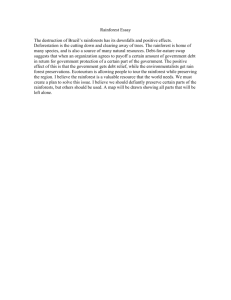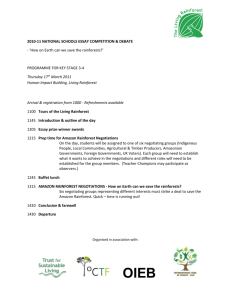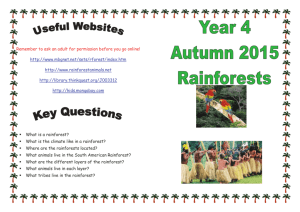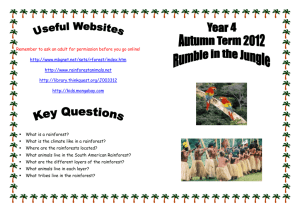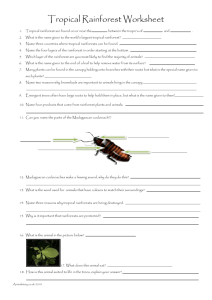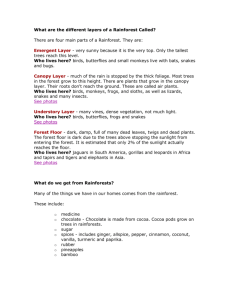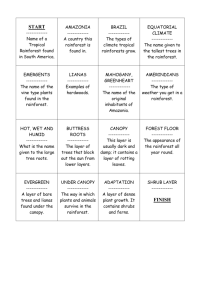Tropical Rain Forest
advertisement
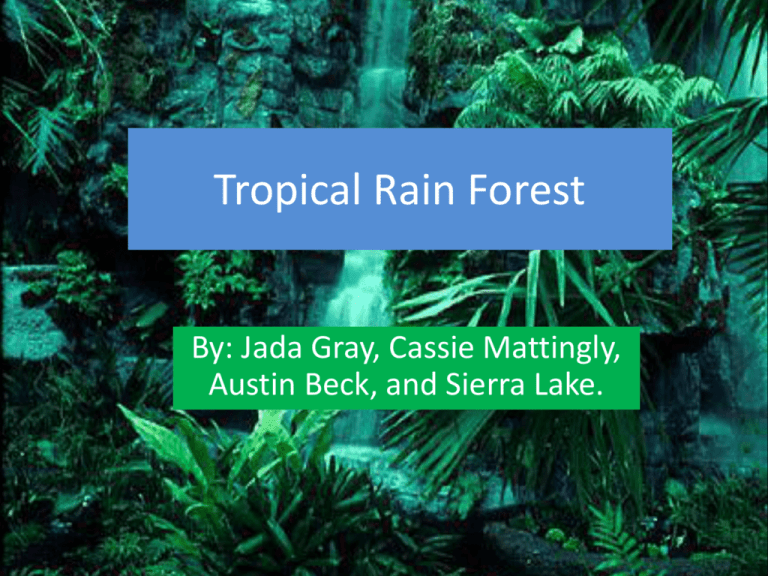
Tropical Rain Forest By: Jada Gray, Cassie Mattingly, Austin Beck, and Sierra Lake. Table of contents. • • • • • • • • • • Slide 1- weather facts. Slide 2- animal facts. Slide 3 & 4- plant facts. Slide 5- rainforest soil. Slide 6 & 7- layers of the rainforest. Slide 8- poison dart frog. Slide 9- types of rainforest. Slide 10- anaconda Slide 11- geography. Slide 12 – 20 questions. Weather facts! •Total Rainfall: 1500 mm or 59.06 inches •No dry season. Rain falls every day. •Temperatures: -During the day: 86-95 degrees Fahrenheit -At night: 68-73 degrees Fahrenheit Populated with… 1. Insects- butterflies and beetles. 2. Arachnids- spiders and ticks. 3. Worms. 4. Reptiles such as snakes and lizards. 5. Amphibians- frogs and toad. 6. Birds- parrots and toucans 7. Mammals- sloths and jaguars Plants that we know, that came from the rainforest.. • Avocados •Pepper • Bananas •Pineapples • Coffee •Peanuts • Lemons •Oranges Plants we don’t have in Kentucky. • Air plants. -Since the food at ground level was being fought for, the air plants grow on canopy trees. They don’t need soil to grow. • Liana -A vine that twines the tall trees and reaches top height. There, it receives sunlight and protection. Soil system • The rainforest has a shallow root system. This is because the nutrients are accumulated on the forest floor and immediately below the soil layer. Layers of the rainforest. 1. Emergents- giant trees that are taller than canopy trees. (birds and insects live there) 2. Canopy- upper parts of trees. (homes for mammals, reptiles, and birds) 3. Under canopy- dark, cool environment under the leaves but over the ground. Layers (cont..) 4. Forest floorteeming with animal life, especially insects. The largest animals in the rainforest live here. Poison dart frog. - Can be yellow, gold, copper, red, green, blue, or black. - Carry their eggs and tadpoles on their backs. - They’re about 2 inches long. - They have enough venom to kill 10 men. - Some people use their venom for hunting. Types of rainforests 1. Monsoon 2. Equatorial 3. Subtropical Anaconda • -They can be up to 40 feet long. • They are in the boa family. • They are the largest predator. • They’re nocturnal. • The can have up to 100 babies at a time. 2030 babies can be up to two feet in length. Interesting facts • Tropical rainforests are located around the equator where temperatures stay near 80 degrees year round. •The largest rainforests are located in South America, Africa, and east Asia. Geography facts • Covers less than 6% of earth's surface. • It produces 40% of earth’s oxygen. • 100-300 species live in 2 ½ acres. • 70% of the plants are trees. • About ¼ of all medicines we use, come from rainforest plants. Zoology question 2 • What percent of the world’s species can be found in the rainforest. 50 % Zoology question 2 • What do monkeys eat ? Bananas, fruits, vegetables, leaves, and flowers. Plant question 1 • What plant can grow in canopy trees without soil? Air plant Plant question 2 • Do the plants have a shallow or a deep root system ? shallow Weather question 1 • Is there a dry season in the rainforest? no Weather question 2 • What is the daily temperature ? 86-95 degrees Geography question 1 • What are the three types of rainforests? Monsoon, equatorial, and subtropical. Geography question 2 2. What % of oxygen do we get from the rainforest? a. 20% b. 40% c. 60% d. 80% 40% Sites. • http://www.enchantedlearning.com/subjects/rainforest/animals/ • http://www.enchantedlearning.com/subjects/rainforest/animals/Samplin g.shtml • http://www.rainforest-alliance.org/kids/facts/faq • http://www.interestinganimals.net/what_do_monkeys_eat/what_do_mo nkeys_eat.html • http://www.geography.learnontheinternet.co.uk/topics/rainforest.html • http://rainforests.mongabay.com/0201.htm • http://www2.needham.k12.ma.us/nhs/cur/Bio96_97/P3/TropicalRF/cgdb 3.html#geography
